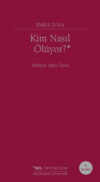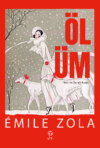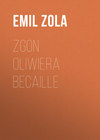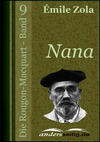Kitabı oku: «His Masterpiece», sayfa 22
In one gallery a fresh scene drew them once more round ‘The Dead Child,’ lying on the floor among other waifs. But this time they jested. A joker pretended to stumble and set his foot in the middle of the canvas, while others trotted along the surrounding little paths, as if trying to find out which was the picture’s top and which its bottom, and declaring that it looked much better topsy-turvy.
Fagerolles himself also began to joke.
‘Come, a little courage, gentlemen; go the round, examine it, you’ll be repaid for your trouble. Really now, gentlemen, be kind, rescue it; pray do that good action!’
They all grew merry in listening to him, but with cruel laughter they refused more harshly than ever. ‘No, no, never!’
‘Will you take it for your “charity”?’ cried a comrade.
This was a custom; the committee-men had a right to a ‘charity’; each of them could select a canvas among the lot, no matter how execrable it might be, and it was thereupon admitted without examination. As a rule, the bounty of this admission was bestowed upon poor artists. The forty paintings thus rescued at the eleventh hour, were those of the beggars at the door – those whom one allowed to glide with empty stomachs to the far end of the table.
‘For my “charity,”’ repeated Fagerolles, feeling very much embarrassed; ‘the fact is, I meant to take another painting for my “charity.” Yes, some flowers by a lady – ’
He was interrupted by loud jeers. Was she pretty? In front of the women’s paintings the gentlemen were particularly prone to sneer, never displaying the least gallantry. And Fagerolles remained perplexed, for the ‘lady’ in question was a person whom Irma took an interest in. He trembled at the idea of the terrible scene which would ensue should he fail to keep his promise. An expedient occurred to him.
‘Well, and you, Bongrand? You might very well take this funny little dead child for your charity.’
Bongrand, wounded to the heart, indignant at all the bartering, waved his long arms:
‘What! I? I insult a real painter in that fashion? Let him be prouder, dash it, and never send anything to the Salon!’
Then, as the others still went on sneering, Fagerolles, desirous that victory should remain to him, made up his mind, with a proud air, like a man who is conscious of his strength and does not fear being compromised.
‘All right, I’ll take it for my “charity,”’ he said.
The others shouted bravo, and gave him a bantering ovation, with a series of profound bows and numerous handshakes. All honour to the brave fellow who had the courage of his opinions! And an attendant carried away in his arms the poor derided, jolted, soiled canvas; and thus it was that a picture by the painter of ‘In the Open Air’ was at last accepted by the hanging committee of the Salon.
On the very next morning a note from Fagerolles apprised Claude, in a couple of lines, that he had succeeded in getting ‘The Dead Child’ admitted, but that it had not been managed without trouble. Claude, despite the gladness of the tidings, felt a pang at his heart; the note was so brief, and was written in such a protecting, pitying style, that all the humiliating features of the business were apparent to him. For a moment he felt sorry over this victory, so much so that he would have liked to take his work back and hide it. Then his delicacy of feeling, his artistic pride again gave way, so much did protracted waiting for success make his wretched heart bleed. Ah! to be seen, to make his way despite everything! He had reached the point when conscience capitulates; he once more began to long for the opening of the Salon with all the feverish impatience of a beginner, again living in a state of illusion which showed him a crowd, a press of moving heads acclaiming his canvas.
By degrees Paris had made it the fashion to patronise ‘varnishing day’ – that day formerly set aside for painters only to come and finish the toilets of their pictures. Now, however, it was like a feast of early fruit, one of those solemnities which set the city agog and attract a tremendous crowd. For a week past the newspaper press, the streets, and the public had belonged to the artists. They held Paris in their grasp; the only matters talked of were themselves, their exhibits, their sayings or doings – in fact, everything connected with them. It was one of those infatuations which at last draw bands of country folk, common soldiers, and even nursemaids to the galleries on days of gratuitous admission, in such wise that fifty thousand visitors are recorded on some fine Sundays, an entire army, all the rear battalions of the ignorant lower orders, following society, and marching, with dilated eyes, through that vast picture shop.
That famous ‘varnishing day’ at first frightened Claude, who was intimidated by the thought of all the fine people whom the newspapers spoke about, and he resolved to wait for the more democratic day of the real inauguration. He even refused to accompany Sandoz. But he was consumed by such a fever, that after all he started off abruptly at eight o’clock in the morning, barely taking time to eat a bit of bread and cheese beforehand. Christine, who lacked the courage to go with him, kissed him again and again, feeling anxious and moved.
‘Mind, my dear, don’t worry, whatever happens,’ said she.
Claude felt somewhat oppressed as he entered the Gallery of Honour. His heart was beating fast from the swiftness with which he had climbed the grand staircase. There was a limpid May sky out of doors, and through the linen awnings, stretched under the glazed roof, there filtered a bright white light, while the open doorways, communicating with the garden gallery, admitted moist gusts of quivering freshness. For a moment Claude drew breath in that atmosphere which was already tainted with a vague smell of varnish and the odour of the musk with which the women present perfumed themselves. At a glance he took stock of the pictures on the walls: a huge massacre scene in front of him, streaming with carmine; a colossal, pallid, religious picture on his left; a Government order, the commonplace delineation of some official festivity, on the right; and then a variety of portraits, landscapes, and indoor scenes, all glaring sharply amid the fresh gilding of their frames. However, the fear which he retained of the folks usually present at this solemnity led him to direct his glances upon the gradually increasing crowd. On a circular settee in the centre of the gallery, from which sprang a sheaf of tropical foliage, there sat three ladies, three monstrously fat creatures, attired in an abominable fashion, who had settled there to indulge in a whole day’s backbiting. Behind him he heard somebody crushing harsh syllables in a hoarse voice. It was an Englishman in a check-pattern jacket, explaining the massacre scene to a yellow woman buried in the depths of a travelling ulster. There were some vacant spaces; groups of people formed, scattered, and formed again further on; all heads were raised; the men carried walking-sticks and had overcoats on their arms, the women strolled about slowly, showing distant profiles as they stopped before the pictures; and Claude’s artistic eye was caught by the flowers in their hats and bonnets, which seemed very loud in tint amid the dark waves of the men’s silk hats. He perceived three priests, two common soldiers who had found their way there no one knew whence, some endless processions of gentlemen decorated with the ribbon of the Legion of Honour, and troops of girls and their mothers, who constantly impeded the circulation. However, a good many of these people knew each other; there were smiles and bows from afar, at times a rapid handshake in passing. And conversation was carried on in a discreet tone of voice, above which rose the continuous tramping of feet.
Then Claude began to look for his own picture. He tried to find his way by means of the initial letters inscribed above the entrances of the galleries, but made a mistake, and went through those on the left hand. There was a succession of open entrances, a perspective of old tapestry door-hangings, with glimpses of the distant pictures. He went as far as the great western gallery, and came back by the parallel suite of smaller galleries without finding that allotted to the letter L. And when he reached the Gallery of Honour again, the crowd had greatly increased. In fact, it was now scarcely possible for one to move about there. Being unable to advance, he looked around, and recognised a number of painters, that nation of painters which was at home there that day, and was therefore doing the honours of its abode. Claude particularly remarked an old friend of the Boutin Studio – a young fellow consumed with the desire to advertise himself, who had been working for a medal, and who was now pouncing upon all the visitors possessed of any influence and forcibly taking them to see his pictures. Then there was a celebrated and wealthy painter who received his visitors in front of his work with a smile of triumph on his lips, showing himself compromisingly gallant with the ladies, who formed quite a court around him. And there were all the others: the rivals who execrated one another, although they shouted words of praise in full voices; the savage fellows who covertly watched their comrades’ success from the corner of a doorway; the timid ones whom one could not for an empire induce to pass through the gallery where their pictures were hung; the jokers who hid the bitter mortification of their defeat under an amusing witticism; the sincere ones who were absorbed in contemplation, trying to understand the various works, and already in fancy distributing the medals. And the painters’ families were also there. One charming young woman was accompanied by a coquettishly bedecked child; a sour-looking, skinny matron of middle-class birth was flanked by two ugly urchins in black; a fat mother had foundered on a bench amid quite a tribe of dirty brats; and a lady of mature charms, still very good-looking, stood beside her grown-up daughter, quietly watching a hussy pass – this hussy being the father’s mistress. And then there were also the models – women who pulled one another by the sleeve, who showed one another their own forms in the various pictorial nudities, talking very loudly the while and dressed without taste, spoiling their superb figures by such wretched gowns that they seemed to be hump-backed beside the well-dressed dolls – those Parisiennes who owed their figures entirely to their dressmakers.
When Claude got free of the crowd, he enfiladed the line of doorways on the right hand. His letter was on that side; but he searched the galleries marked with an L without finding anything. Perhaps his canvas had gone astray and served to fill up a vacancy elsewhere. So when he had reached the large eastern gallery, he set off along a number of other little ones, a secluded suite visited by very few people, where the pictures seemed to frown with boredom. And there again he found nothing. Bewildered, distracted, he roamed about, went on to the garden gallery, searching among the superabundant exhibits which overflowed there, pallid and shivering in the crude light; and eventually, after other distant excursions, he tumbled into the Gallery of Honour for the third time.
There was now quite a crush there. All those who in any way create a stir in Paris were assembled together – the celebrities, the wealthy, the adored, talent, money and grace, the masters of romance, of the drama and of journalism, clubmen, racing men and speculators, women of every category, hussies, actresses and society belles. And Claude, angered by his vain search, grew amazed at the vulgarity of the faces thus massed together, at the incongruity of the toilets – but a few of which were elegant, while so many were common looking – at the lack of majesty which that vaunted ‘society’ displayed, to such a point, indeed, that the fear which had made him tremble was changed into contempt. Were these the people, then, who were going to jeer at his picture, provided it were found again? Two little reporters with fair complexions were completing a list of persons whose names they intended to mention. A critic pretended to take some notes on the margin of his catalogue; another was holding forth in professor’s style in the centre of a party of beginners; a third, all by himself, with his hands behind his back, seemed rooted to one spot, crushing each work beneath his august impassibility. And what especially struck Claude was the jostling flock-like behaviour of the people, their banded curiosity in which there was nothing youthful or passionate, the bitterness of their voices, the weariness to be read on their faces, their general appearance of suffering. Envy was already at work; there was the gentleman who makes himself witty with the ladies; the one who, without a word, looks, gives a terrible shrug of the shoulders, and then goes off; and there were the two who remain for a quarter of an hour leaning over the handrail, with their noses close to a little canvas, whispering very low and exchanging the knowing glances of conspirators.
But Fagerolles had just appeared, and amid the continuous ebb and flow of the groups there seemed to be no one left but him. With his hand outstretched, he seemed to show himself everywhere at the same time, lavishly exerting himself to play the double part of a young ‘master’ and an influential member of the hanging committee. Overwhelmed with praise, thanks, and complaints, he had an answer ready for everybody without losing aught of his affability. Since early morning he had been resisting the assault of the petty painters of his set who found their pictures badly hung. It was the usual scamper of the first moment, everybody looking for everybody else, rushing to see one another and bursting into recriminations – noisy, interminable fury. Either the picture was too high up, or the light did not fall upon it properly, or the paintings near it destroyed its effect; in fact, some talked of unhooking their works and carrying them off. One tall thin fellow was especially tenacious, going from gallery to gallery in pursuit of Fagerolles, who vainly explained that he was innocent in the matter and could do nothing. Numerical order was followed, the pictures for each wall were deposited on the floor below and then hung up without anybody being favoured. He carried his obligingness so far as to promise his intervention when the galleries were rearranged after the medals had been awarded; but even then he did not manage to calm the tall thin fellow, who still continued pursuing him.
Claude for a moment elbowed his way through the crowd to go and ask Fagerolles where his picture had been hung. But on seeing his friend so surrounded, pride restrained him. Was there not something absurd and painful about this constant need of another’s help? Besides, he suddenly reflected that he must have skipped a whole suite of galleries on the right-hand side; and, indeed, there were fresh leagues of painting there. He ended by reaching a gallery where a stifling crowd was massed in front of a large picture which filled the central panel of honour. At first he could not see it, there was such a surging sea of shoulders, such a thick wall of heads, such a rampart of hats. People rushed forward with gaping admiration. At length, however, by dint of rising on tiptoe, he perceived the marvel, and recognised the subject, by what had been told him.
It was Fagerolles’ picture. And in that ‘Picnic’ he found his own forgotten work, ‘In the Open Air,’ the same light key of colour, the same artistic formula, but softened, trickishly rendered, spoilt by skin-deep elegance, everything being ‘arranged’ with infinite skill to satisfy the low ideal of the public. Fagerolles had not made the mistake of stripping his three women; but, clad in the audacious toilets of women of society, they showed no little of their persons. As for the two gallant gentlemen in summer jackets beside them, they realised the ideal of everything most distingue; while afar off a footman was pulling a hamper off the box of a landau drawn up behind the trees. The whole of it, the figures, the drapery, the bits of still life of the repast, stood out gaily in full sunlight against the darkened foliage of the background; and the supreme skill of the painter lay in his pretended audacity, in a mendacious semblance of forcible treatment which just sufficed to send the multitude into ecstasies. It was like a storm in a cream-jug!
Claude, being unable to approach, listened to the remarks around him. At last there was a man who depicted real truth! He did not press his points like those fools of the new school; he knew how to convey everything without showing anything. Ah! the art of knowing where to draw the line, the art of letting things be guessed, the respect due to the public, the approval of good society! And withal such delicacy, such charm and art! He did not unseasonably deliver himself of passionate things of exuberant design; no, when he had taken three notes from nature, he gave those three notes, nothing more. A newspaper man who arrived went into raptures over the ‘Picnic,’ and coined the expression ‘a very Parisian style of painting.’ It was repeated, and people no longer passed without declaring that the picture was ‘very Parisian’ indeed.
All those bent shoulders, all those admiring remarks rising from a sea of spines, ended by exasperating Claude; and seized with a longing to see the faces of the folk who created success, he manoeuvred in such a way as to lean his back against the handrail hard by. From that point, he had the public in front of him in the grey light filtering through the linen awning which kept the centre of the gallery in shade; whilst the brighter light, gliding from the edges of the blinds, illumined the paintings on the walls with a white flow, in which the gilding of the frames acquired a warm sunshiny tint. Claude at once recognised the people who had formerly derided him – if these were not the same, they were at least their relatives – serious, however, and enraptured, their appearance greatly improved by their respectful attention. The evil look, the weariness, which he had at first remarked on their faces, as envious bile drew their skin together and dyed it yellow, disappeared here while they enjoyed the treat of an amiable lie. Two fat ladies, open-mouthed, were yawning with satisfaction. Some old gentlemen opened their eyes wide with a knowing air. A husband explained the subject to his young wife, who jogged her chin with a pretty motion of the neck. There was every kind of marvelling, beatifical, astonished, profound, gay, austere, amidst unconscious smiles and languid postures of the head. The men threw back their black silk hats, the flowers in the women’s bonnets glided to the napes of their necks. And all the faces, after remaining motionless for a moment, were then drawn aside and replaced by others exactly like them.
Then Claude, stupefied by that triumph, virtually forgot everything else. The gallery was becoming too small, fresh bands of people constantly accumulated inside it. There were no more vacant spaces, as there had been early in the morning; no more cool whiffs rose from the garden amid the ambient smell of varnish; the atmosphere was now becoming hot and bitter with the perfumes scattered by the women’s dresses. Before long the predominant odour suggested that of a wet dog. It must have been raining outside; one of those sudden spring showers had no doubt fallen, for the last arrivals brought moisture with them – their clothes hung about them heavily and seemed to steam as soon as they encountered the heat of the gallery. And, indeed, patches of darkness had for a moment been passing above the awning of the roof. Claude, who raised his eyes, guessed that large clouds were galloping onward lashed by the north wind, that driving rain was beating upon the glass panes. Moire-like shadows darted along the walls, all the paintings became dim, the spectators themselves were blended in obscurity until the cloud was carried away, whereupon the painter saw the heads again emerge from the twilight, ever agape with idiotic rapture.
But there was another cup of bitterness in reserve for Claude. On the left-hand panel, facing Fagerolles’, he perceived Bongrand’s picture. And in front of that painting there was no crush whatever; the visitors walked by with an air of indifference. Yet it was Bongrand’s supreme effort, the thrust he had been trying to give for years, a last work conceived in his obstinate craving to prove the virility of his decline. The hatred he harboured against the ‘Village Wedding,’ that first masterpiece which had weighed upon all his toilsome after-life, had impelled him to select a contrasting but corresponding subject: the ‘Village Funeral’ – the funeral of a young girl, with relatives and friends straggling among fields of rye and oats. Bongrand had wrestled with himself, saying that people should see if he were done for, if the experience of his sixty years were not worth all the lucky dash of his youth; and now experience was defeated, the picture was destined to be a mournful failure, like the silent fall of an old man, which does not even stay passers-by in their onward course. There were still some masterly bits, the choirboy holding the cross, the group of daughters of the Virgin carrying the bier, whose white dresses and ruddy flesh furnished a pretty contrast with the black Sunday toggery of the rustic mourners, among all the green stuff; only the priest in his alb, the girl carrying the Virgin’s banner, the family following the body, were drily handled; the whole picture, in fact, was displeasing in its very science and the obstinate stiffness of its treatment. One found in it a fatal, unconscious return to the troubled romanticism which had been the starting-point of the painter’s career. And the worst of the business was that there was justification for the indifference with which the public treated that art of another period, that cooked and somewhat dull style of painting, which no longer stopped one on one’s way, since great blazes of light had come into vogue.
It precisely happened that Bongrand entered the gallery with the hesitating step of a timid beginner, and Claude felt a pang at his heart as he saw him give a glance at his neglected picture and then another at Fagerolles’, which was bringing on a riot. At that moment the old painter must have been acutely conscious of his fall. If he had so far been devoured by the fear of slow decline, it was because he still doubted; and now he obtained sudden certainty; he was surviving his reputation, his talent was dead, he would never more give birth to living, palpitating works. He became very pale, and was about to turn and flee, when Chambouvard, the sculptor, entering the gallery by the other door, followed by his customary train of disciples, called to him without caring a fig for the people present:
‘Ah! you humbug, I catch you at it – admiring yourself!’
He, Chambouvard, exhibited that year an execrable ‘Reaping Woman,’ one of those stupidly spoilt figures which seemed like hoaxes on his part, so unworthy they were of his powerful hands; but he was none the less radiant, feeling certain that he had turned out yet another masterpiece, and promenading his god-like infallibility through the crowd which he did not hear laughing at him.
Bongrand did not answer, but looked at him with eyes scorched by fever.
‘And my machine downstairs?’ continued the sculptor. ‘Have you seen it? The little fellows of nowadays may try it on, but we are the only masters – we, old France!’
And thereupon he went off, followed by his court and bowing to the astonished public.
‘The brute!’ muttered Bongrand, suffocating with grief, as indignant as at the outburst of some low-bred fellow beside a deathbed.
He perceived Claude, and approached him. Was it not cowardly to flee from this gallery? And he determined to show his courage, his lofty soul, into which envy had never entered.
‘Our friend Fagerolles has a success and no mistake,’ he said. ‘I should be a hypocrite if I went into ecstasies over his picture, which I scarcely like; but he himself is really a very nice fellow indeed. Besides, you know how he exerted himself on your behalf.’
Claude was trying to find a word of admiration for the ‘Village Funeral.’
‘The little cemetery in the background is so pretty!’ he said at last. ‘Is it possible that the public – ’
But Bongrand interrupted him in a rough voice:
‘No compliments of condolence, my friend, eh? I see clear enough.’
At this moment somebody nodded to them in a familiar way, and Claude recognised Naudet – a Naudet who had grown and expanded, gilded by the success of his colossal strokes of business. Ambition was turning his head; he talked about sinking all the other picture dealers; he had built himself a palace, in which he posed as the king of the market, centralising masterpieces, and there opening large art shops of the modern style. One heard a jingle of millions on the very threshold of his hall; he held exhibitions there, even ran up other galleries elsewhere; and each time that May came round, he awaited the visits of the American amateurs whom he charged fifty thousand francs for a picture which he himself had purchased for ten thousand. Moreover, he lived in princely style, with a wife and children, a mistress, a country estate in Picardy, and extensive shooting grounds. His first large profits had come from the rise in value of works left by illustrious artists, now defunct, whose talent had been denied while they lived, such as Courbet, Millet, and Rousseau; and this had ended by making him disdain any picture signed by a still struggling artist. However, ominous rumours were already in circulation. As the number of well-known pictures was limited, and the number of amateurs could barely be increased, a time seemed to be coming when business would prove very difficult. There was talk of a syndicate, of an understanding with certain bankers to keep up the present high prices; the expedient of simulated sales was resorted to at the Hotel Drouot – pictures being bought in at a big figure by the dealer himself – and bankruptcy seemed to be at the end of all that Stock Exchange jobbery, a perfect tumble head-over-heels after all the excessive, mendacious agiotage.
‘Good-day, dear master,’ said Naudet, who had drawn near. ‘So you have come, like everybody else, to see my Fagerolles, eh?’
He no longer treated Bongrand in the wheedling, respectful manner of yore. And he spoke of Fagerolles as of a painter belonging to him, of a workman to whom he paid wages, and whom he often scolded. It was he who had settled the young artist in the Avenue de Villiers, compelling him to have a little mansion of his own, furnishing it as he would have furnished a place for a hussy, running him into debt with supplies of carpets and nick-nacks, so that he might afterwards hold him at his mercy; and now he began to accuse him of lacking orderliness and seriousness, of compromising himself like a feather-brain. Take that picture, for instance, a serious painter would never have sent it to the Salon; it made a stir, no doubt, and people even talked of its obtaining the medal of honour; but nothing could have a worse effect on high prices. When a man wanted to get hold of the Yankees, he ought to know how to remain at home, like an idol in the depths of his tabernacle.
‘You may believe me or not, my dear fellow,’ he said to Bongrand, ‘but I would have given twenty thousand francs out of my pocket to prevent those stupid newspapers from making all this row about my Fagerolles this year.’
Bongrand, who, despite his sufferings, was listening bravely, smiled.
‘In point of fact,’ he said, ‘they are perhaps carrying indiscretion too far. I read an article yesterday in which I learnt that Fagerolles ate two boiled eggs every morning.’
He laughed over the coarse puffery which, after a first article on the ‘young master’s’ picture, as yet seen by nobody, had for a week past kept all Paris occupied about him. The whole fraternity of reporters had been campaigning, stripping Fagerolles to the skin, telling their readers all about his father, the artistic zinc manufacturer, his education, the house in which he resided, how he lived, even revealing the colour of his socks, and mentioning a habit he had of pinching his nose. And he was the passion of the hour, the ‘young master’ according to the tastes of the day, one who had been lucky enough to miss the Prix de Rome, and break off with the School of Arts, whose principles, however, he retained. After all, the success of that style of painting which aims merely at approximating reality, not at rendering it in all its truth, was the fortune of a season which the wind brings and blows away again, a mere whim on the part of the great lunatic city; the stir it caused was like that occasioned by some accident, which upsets the crowd in the morning and is forgotten by night amidst general indifference.
However, Naudet noticed the ‘Village Funeral.’
‘Hullo! that’s your picture, eh?’ he said. ‘So you wanted to give a companion to the “Wedding”? Well, I should have tried to dissuade you! Ah! the “Wedding”! the “Wedding”!’
Bongrand still listened to him without ceasing to smile. Barely a twinge of pain passed over his trembling lips. He forgot his masterpieces, the certainty of leaving an immortal name, he was only cognisant of the vogue which that youngster, unworthy of cleaning his palette, had so suddenly and easily acquired, that vogue which seemed to be pushing him, Bongrand, into oblivion – he who had struggled for ten years before he had succeeded in making himself known. Ah! when the new generations bury a man, if they only knew what tears of blood they make him shed in death!










